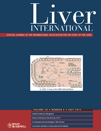
LIVER INTERNATIONAL
Scope & Guideline
Transforming hepatological discourse with open access insights.
Introduction
Aims and Scopes
- Metabolic Liver Disorders:
The journal consistently explores metabolic dysfunction-associated liver diseases (MAFLD) and its implications, emphasizing the relationship between metabolic syndrome, liver health, and overall patient outcomes. - Viral Hepatitis Research:
A significant portion of the publications focuses on hepatitis B and C, including new treatment strategies, epidemiology, and the challenges of achieving viral eradication and elimination. - Innovative Diagnostic Techniques:
Liver International highlights advancements in diagnostic methodologies, including non-invasive imaging and biomarkers, to assess liver disease progression and treatment efficacy. - Liver Cancer Studies:
Research on hepatocellular carcinoma (HCC) is a major focus, encompassing topics from early diagnosis and prognostic factors to treatment outcomes and novel therapeutic strategies. - Clinical Management and Guidelines:
The journal provides insights into clinical practices, treatment guidelines, and the integration of multidisciplinary approaches to improve liver disease management. - Socioeconomic and Public Health Impacts:
Articles often address the socioeconomic factors affecting liver disease prevalence and treatment access, highlighting disparities among different populations. - Drug-Induced Liver Injury:
The journal discusses the mechanisms and implications of drug-induced liver injury, providing insights into prevention, diagnosis, and management. - Emerging Therapies and Clinical Trials:
Research on new therapeutic agents and clinical trials is a recurring theme, focusing on innovative treatments for various liver diseases, including antiviral therapies and immunotherapies.
Trending and Emerging
- Metabolic Dysfunction and Liver Disease:
There is a significant increase in research focused on metabolic dysfunction-associated fatty liver disease (MAFLD) and its relationship with obesity, diabetes, and cardiovascular health. - Artificial Intelligence and Machine Learning Applications:
Emerging studies are increasingly applying AI and machine learning to predict liver disease outcomes, enhance diagnostic accuracy, and optimize treatment strategies. - Health Disparities and Social Determinants:
A growing body of work is examining the impact of socioeconomic factors on liver disease prevalence and treatment access, emphasizing the need for equitable healthcare solutions. - Long-term Outcomes Following Viral Hepatitis Treatment:
Increasing attention is being paid to the long-term outcomes of patients treated for chronic hepatitis B and C, including the risk of liver cancer and reinfection. - Integration of Gut Microbiome Research:
Research exploring the gut-liver axis and its implications for liver disease is on the rise, focusing on how gut health influences liver conditions. - Immunotherapy in Liver Cancer:
There is a notable trend toward investigating immunotherapeutic approaches for treating hepatocellular carcinoma, reflecting advancements in cancer treatment. - Non-invasive Monitoring Techniques:
The development and validation of non-invasive tools for assessing liver stiffness and fibrosis are gaining momentum, providing alternatives to traditional biopsy.
Declining or Waning
- Traditional Liver Biopsy Techniques:
There is a noticeable decline in studies focused on conventional liver biopsy techniques as non-invasive methods gain favor for diagnosing liver diseases. - Acute Liver Failure Studies:
Research specifically targeting acute liver failure has waned, possibly due to the increasing focus on chronic liver diseases and their long-term management. - Alcohol-Related Liver Disease Studies:
The frequency of publications solely addressing alcohol-related liver disease has decreased, which may reflect a broader shift toward understanding metabolic and multifactorial liver diseases. - Hepatitis E Research:
Interest in hepatitis E research appears to be declining, with fewer studies published in recent years as other liver diseases gain more attention.
Similar Journals
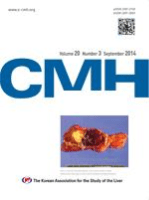
Clinical and Molecular Hepatology
Exploring the frontiers of liver disease research.Clinical and Molecular Hepatology, published by the Korean Association for the Study of Liver, stands at the forefront of hepatology, offering a significant platform for research and innovation in liver diseases. Established in 1995 as an open access journal, it aims to disseminate high-quality research that spans the fields of hepatology, molecular biology, and medicine. With an impressive impact factor ranking it in the Q1 category for 2023 in both Hepatology and Molecular Biology, the journal facilitates a rich exchange of knowledge among professionals, researchers, and students globally. With its dedicated coverage from 2012 to 2024 and exceptional Scopus rankings placing it within the top 10% of journals in its field, Clinical and Molecular Hepatology is an indispensable resource for advancing the understanding and treatment of liver conditions. Located in Seoul, South Korea, the journal emphasizes rigorous peer review and is committed to enhancing clinical practice and molecular research, making it an ideal venue for groundbreaking studies in liver health.
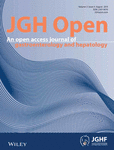
JGH Open
Bridging Knowledge Gaps in Digestive HealthJGH Open is a prominent open-access journal dedicated to advancing knowledge in the fields of Gastroenterology and Hepatology, published by WILEY. Since its inception in 2017, the journal has served as a crucial platform for researchers, professionals, and students to disseminate innovative research findings and clinical insights. With an impact factor and Scopus rankings reflecting its steady growth—ranking in the 3rd quartile for both Gastroenterology (Q3) and Hepatology (Q3)—JGH Open is positioned within the competitive landscape of medicine. Its commitment to open access enhances the visibility and accessibility of high-quality research, ensuring that significant advancements in understanding diseases of the gastrointestinal tract and liver reach a broad audience. With a focus on collaboration and dissemination of knowledge, JGH Open aims to contribute to the global discourse and improve outcomes in gastrointestinal health.

Hepatology Communications
Connecting researchers and clinicians in hepatology.Hepatology Communications, published by Lippincott Williams & Wilkins, serves as a pioneering platform in the field of hepatology, dedicated to advancing the understanding of liver diseases and treatments. Since its inception in 2017, this open access journal has rapidly gained recognition, achieving an impressive Q1 ranking in Hepatology as of 2023, and appealing to a diverse audience of researchers, clinicians, and students alike. With its focus on high-quality research and clinical studies, the journal aims to facilitate impactful discussions and disseminate vital findings that address the challenges faced in liver health. Operating out of the United States, and accessible globally, Hepatology Communications is committed to fostering a collaborative research environment and enhancing the visibility of scholarly work in hepatology, ultimately driving forward innovations in patient care and treatment strategies.
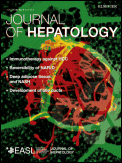
JOURNAL OF HEPATOLOGY
Empowering Medical Professionals with Premier ResearchJOURNAL OF HEPATOLOGY, published by Elsevier, stands as a preeminent source in the field of Hepatology, with its impact underscored by a remarkable 2023 Category Quartile of Q1 and a Scopus rank of 3rd out of 82 journals, placing it in the 96th percentile for the discipline. Since its inception in 1985, this journal has been a vital conduit for the dissemination of pioneering research, clinical studies, and reviews related to liver diseases and their impact on global health. Although it currently does not offer open access options, the journal is committed to providing top-tier content to its readership—researchers, medical professionals, and students—in order to advance knowledge and foster innovation in hepatology. With a broad and inclusive scope, it aims to cover significant breakthroughs, therapeutic advancements, and epidemiological studies, continually pushing the boundaries of understanding in liver health. The journal is based in Amsterdam, Netherlands, and remains an essential resource for those dedicated to the progression of hepatologic science.

Journal of Clinical and Translational Hepatology
Uniting research and clinical excellence in hepatology.Journal of Clinical and Translational Hepatology is an esteemed publication dedicated to advancing the field of hepatology through innovative research and clinical insights. Published by XIA & HE PUBLISHING INC, this journal connects researchers and healthcare professionals in the exploration of liver diseases and their management. With an impact factor that reflects its significant contribution to the discipline, the Journal holds a commendable Q2 classification in Hepatology as of 2023, and it ranks highly in both Gastroenterology and Hepatology categories on Scopus, positioning it within the top 80th percentile of its field. Although the journal is not open access, it provides its audience with invaluable information, encouraging collaboration that aims to translate clinical findings into transformative patient care. With a publication history spanning from 2013 to 2024, the Journal of Clinical and Translational Hepatology has established itself as a vital resource for researchers, clinicians, and students alike, making it a prominent voice in the hepatological community.

Hepatitis Monthly
Advancing knowledge in hepatology and infectious diseases.Hepatitis Monthly, published by BRIEFLAND in the Netherlands, is a pivotal journal in the fields of hepatology and infectious diseases. Established in 2007, it continues to make significant contributions to the understanding and management of hepatitis and related viral infections with a publication timeline extending through to 2024. Aiming to disseminate high-quality research, the journal serves as a forum for groundbreaking studies and innovations essential for healthcare professionals, researchers, and students alike. While it currently holds Q4 rankings in both hepatology and infectious disease categories, its ongoing commitment to addressing pressing health issues makes it an important resource in the academic community. Although it operates under a traditional access model, Hepatitis Monthly not only publishes original research articles, reviews, and case studies but also encourages the exchange of knowledge that helps shape future research directions and clinical practices. As it continues to explore the complexities surrounding viral hepatitis, this journal invites researchers to contribute to its mission of advancing scientific understanding and improving patient care.
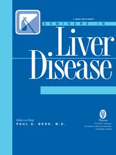
SEMINARS IN LIVER DISEASE
Pioneering discussions in the field of hepatology.SEMINARS IN LIVER DISEASE is a premier journal dedicated to advancing the field of hepatology, published by THIEME MEDICAL PUBL INC. Established in 1981, it has become a respected resource within the academic community, providing high-quality peer-reviewed articles that cover a broad range of topics related to liver diseases. With an impressive impact factor and recognized as a Q1 journal in the hepatology category, it ranks 17th out of 82 journals in the field, placing it in the top 21% of its category according to Scopus rankings. Although it does not offer open access, the journal’s rigorous standards and extensive network ensure that it reaches a wide audience of clinicians, researchers, and students, fostering knowledge and innovation in liver disease management. The journal's objectives focus on disseminating critical insights and promoting informed discussions that can pave the way for future research and clinical advancements in hepatology.

Hepatology Forum
Fostering collaboration in the fight against liver disorders.Hepatology Forum is an esteemed journal dedicated to disseminating cutting-edge research and insights in the fields of gastroenterology and hepatology. Published by KARE PUBL in Turkey, this journal serves as a vital platform for researchers, clinicians, and healthcare professionals aiming to advance their knowledge and practices related to liver diseases and gastrointestinal disorders. With an ISSN of 1307-5888 and an E-ISSN of 2757-7392, it features peer-reviewed articles that encompass a wide range of topics from basic research to clinical applications. Although categorized in the Q3 quartile for both gastroenterology and hepatology in 2023, Hepatology Forum continues to show significant potential for growth and impact, as evidenced by its Scopus rankings. Through its commitment to open scientific exchange, the journal not only facilitates the sharing of innovative methodologies and findings but also fosters networking among professionals in the field. As it converges through the years from 2020 to 2024, Hepatology Forum remains an important resource for the advancement of liver health and diseases, appealing to both established experts and emerging scholars alike.

JHEP Reports
Driving excellence in gastroenterology and internal medicine.JHEP Reports, published by ELSEVIER, stands at the forefront of scholarly communication in the fields of Gastroenterology, Hepatology, Immunology and Allergy, and Internal Medicine. As an Open Access journal since 2019, it provides a platform for the dissemination of high-quality research findings, making vital information readily accessible to a global audience. With a commendable impact characterized by a Q1 category ranking across four medical disciplines in 2023, JHEP Reports demonstrates its significance and influence, reflected in its impressive Scopus ranks—#11 in Gastroenterology and #14 in Internal Medicine, amongst others. This esteemed journal not only plays a critical role in advancing knowledge but also fosters collaboration among researchers, practitioners, and students keen on exploring innovations and breakthroughs in health sciences. At RADARWEG 29, 1043 NX AMSTERDAM, NETHERLANDS, JHEP Reports is committed to bridging the gap between research and application, ushering in a new era of informed and effective healthcare solutions.

Korean Journal of Gastroenterology
Empowering Clinicians with Cutting-Edge InsightsKorean Journal of Gastroenterology (ISSN: 1598-9992, E-ISSN: 2233-6869), published by the Korean Society of Gastroenterology, has been a premier outlet for research and advancements in the field of gastroenterology since its inception in 1968. This open-access journal, based in South Korea, fosters a global dialogue on gastrointestinal health, embracing contributions from a diverse array of disciplines within medicine. It is currently ranked in the Q4 quartile for miscellaneous medicine and holds a Scopus rank of #323 out of 636 in general medicine, reflecting its commitment to publishing impactful research despite its relatively recent establishment in high-impact metrics. With a continuous publication timeline extending through to 2024, the journal aims to enhance understanding of gastrointestinal disorders and promote innovative treatments, making it an essential resource for researchers, clinicians, and students alike who seek to stay abreast of the latest developments and clinical applications in gastroenterology.